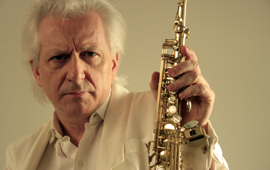> [Archived] Interviews

Interview with saxophonist Daniel Kientzy
Sunday, 25 October 2009
, ora 12.38
The
PROmoZICA trio which brings together the famous French saxophonist
Daniel Kientzy, violinist Cornelia Petroiu and Portuguese Reina Portuondo,
who is a specialist in the electronic media, organizes a tour in Spain
between Octomber 28th and November 13th. Among the musical pieces tackled
in their recitals, the creations of composers Adina Dumitrescu's, Costin
Miereanu's and Octavian Nemescu's are also present. Daniel Kientzy has
accepted to give us an exclusive interview about what made him choose
these compositions and about what generated his fondness for electro-acoustic
music.
In the repertoire which you will be performing during the tour in Spain, you have also included opera signed by Romanian contemporary composers, by Costin Miereanu, Adina Dumitrescu and Octavian Nemescu, respectively. What made you choose their works?
It is hard for me to answer this question because it rarely happens to me to perform without including Romanian music in my recital; this music is a part of my universe. It would be strange for me not to include Romanian creations in the recitals. Almost everything I play is Romanian music.
What is characteristic to the works created by Romanian contemporary composers?
Romanian music has a particular ethos, even if the authors of the opera seem to be different. There is something that comes from the relief and this country's character, which combines the profound sources of the culture with the modern elements.
How has the Spanish public received Romanian works so far?
Very well. The Romanian contemporary music school is one of the most accessible ones. Romanian composers' works are among the most "exportable" pieces in the world. It is easy to travel and present Romanian music because it is very appreciated.
What makes you fond of electronic music?
This music gives you the possibility to extend the musical poetry beyond common possibilities. The instruments have many possibilities, but the electronic media extend these capacities and I am interested in poetry, dreaming and the absolute provided by electro-acoustic music.
In the repertoire which you will be performing during the tour in Spain, you have also included opera signed by Romanian contemporary composers, by Costin Miereanu, Adina Dumitrescu and Octavian Nemescu, respectively. What made you choose their works?
It is hard for me to answer this question because it rarely happens to me to perform without including Romanian music in my recital; this music is a part of my universe. It would be strange for me not to include Romanian creations in the recitals. Almost everything I play is Romanian music.
What is characteristic to the works created by Romanian contemporary composers?
Romanian music has a particular ethos, even if the authors of the opera seem to be different. There is something that comes from the relief and this country's character, which combines the profound sources of the culture with the modern elements.
How has the Spanish public received Romanian works so far?
Very well. The Romanian contemporary music school is one of the most accessible ones. Romanian composers' works are among the most "exportable" pieces in the world. It is easy to travel and present Romanian music because it is very appreciated.
What makes you fond of electronic music?
This music gives you the possibility to extend the musical poetry beyond common possibilities. The instruments have many possibilities, but the electronic media extend these capacities and I am interested in poetry, dreaming and the absolute provided by electro-acoustic music.
Petra Gherasim
Translated by Elena Lavinia Diaconescu and Valentina Tache
MA Students, MTTLC, Bucharest University
Translated by Elena Lavinia Diaconescu and Valentina Tache
MA Students, MTTLC, Bucharest University
Return to archived Interviews














